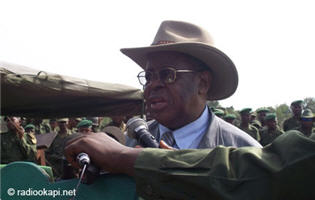
The Democratic Republic of Congo (DRC) has entered into a decisive phase in the process of reconstruction and democratization, but the government still has much to do to get rid of insecurity.
In a recent press release, Congolese Defense Minister Charles Muando Nsimba announced the operation initiated by the armed forces FARDC and the UN mission MONUC to combat Rwandan rebels and other insurgents were on the right track with positive results.
The minister said the situation has much improved, especially in the once turbulent east, while acknowledging the government needs further efforts to boost security.
FARDC and MONUC were deployed to a great extent to neutralize these rebel forces which form the greatest obstacle to peace and economic reconstruction in the east of the country.
In Orientale province bordering Uganda and Sudan, the notorious Ugandan rebel LRA is still able to launch attacks on villages where cases of killing, looting, rape and child abduction were reported.
The LRA has waged one of the longest guerrilla wars in Africa since 1986, roaming between Uganda, Sudan, the DRC and Central African Republic. Its guerrilla-style warfare has left tens of thousands dead and 2 million homeless over years.
The three neighboring countries launched the anti-LRA operation on Dec. 14, declaring they had wiped out 80 percent of the rebel group at the end of the crackdown in March.
Although the joint military action dismantled the LRA's main base in the Garamba national park, its remnants killed more than 900 civilians in retaliation afterwards, sparking an outcry from human rights activists.
CONFRONTATION IN EQUATOR PROVINCE
Elsewhere in the central African country, clashes were reported in northern Equator province on Oct. 29, killing 47 people including police officers and civilians in dispute over fishponds.
Col. Joly Limengo, police inspector in the province, said police officers were attacked when they tried to intervene the dogfight between two villages over fishing rights.
Radio Okapi said hundreds of villagers crossed River Oubangi into the neighboring Republic of Congo in the aftermath of the confrontation, although the situation was brought under control.
Col. Limengo identified the disputing villages as Iyele and Muzala, respectively belonging to the tribes of Lobala and Boba.
The ethnic bloodshed adds to the complications in which the war-torn country is struggling out of the years of conflict in cooperation with neighboring countries and with the backing of the international community.
TENSION BETWEEN DRC AND ANGOLA
While the DRC has improved ties with its former neighboring foes Rwanda and Uganda in joint military actions, it recently witnessed tensions with the southern neighbor Angola over immigration.
In the southwestern province of Bas-Congo, the two countries exchanged the expulsion of nationals in the past months, chilling bilateral relations and deteriorating border security.
The worsening situation has led to an exodus of thousands of people from one part to another.
According to diplomatic sources, Angolan President Edouardo Dos Santos decided to boycott the recent summit of the Economic community of Central African states (CEEAC) hosted by Kinshasa to express his disappointments following the retaliatory action against the Angolan nationals living in the DRC.
The two neighbors, however, have no intention of seeing further deterioration. Both sides have agreed to set up a joint commission for border control while searching for a way-out of the standoff along their 4,300 km frontier.
Related articles
- • Tshisekedi Announces Government of National Unity and Calls for Unity Against M23 Rebels (February 23, 2025)
- • UN Security Council Calls on Rwanda to Stop Supporting M23 Rebels in DR Congo (February 22, 2025)
- • Rwanda-Backed M23 Rebels Summarily Executed Children in Bukavu, UN Reports (February 19, 2025)
- • DR Congo Citizens Head to Polls to Elect President, Members of Parliament (December 20, 2023)
- • Ebola outbreak declared an international Public Health Emergency (July 17, 2019)
- • Jean-Pierre Bemba Returns to DR Congo (August 1, 2018)
- • At least 30 dead after massacres in Ituri (March 2, 2018)
- • Botswana Urges Joseph Kabila to Step Down (February 26, 2018)
- • No elections in DR Congo in December without electronic voting machines: INEC (February 13, 2018)
- • DR Congo reach final of African Nations Championship (February 3, 2016)
- • Peacekeepers, Congo Army to Resume Joint Fight Against Rwandan Rebels (January 28, 2016)
- • Political tensions 'running high' in DR Congo ahead of 2016 elections (October 7, 2015)
- • UN Report Blames Ugandan Islamists for 237 Killings in DR Congo (May 14, 2015)
- • DRC Army Putting Pressure on FDLR (April 1, 2015)
- • Police Open Fire on Crowd Protesting Election Law Change (January 19, 2015)
- • ICC Case Against Bemba Wrapping Up as Another Opens (November 12, 2014)
- • Southern African Leaders to Meet in Zimbabwe (August 15, 2014)
- • Senior UN officials urge Brazzaville to halt expulsion of DR Congo nationals (May 26, 2014)
- • 15 dead in football match stampede in Kinshasa (May 12, 2014)
- • Kerry Calls on Kabila to Honor Constitution (May 4, 2014)
- • Kerry in DR Congo for Security Talks (May 3, 2014)
- • Security Council extends UN mission, intervention force in DR Congo for one year (March 28, 2014)
- • U.S. sending more personnel to Uganda to hunt LRA leader Joseph Kony (March 24, 2014)
- • Death toll in Lake Albert boat accident rises to 108 people (March 24, 2014)
- • New DR Congo amnesty law welcomed by UN envoys (February 5, 2014)
- • Colonel Mamadou Ndala Is Killed in Ambush (January 2, 2014)
- • No 'Peace Deal' With Defeated M23 Rebels, DR Congo Says (November 11, 2013)
- • Congo Will Not Sign a 'Peace Deal' With Defeated M23 Rebels, Government Says (November 6, 2013)
- • Congo Army Takes Control of Mbuzi Hill From M23 Rebels (November 4, 2013)
- • Kabila Congratulates Congo Army for Defeating M23 Rebels (October 30, 2013)
Tags: |







